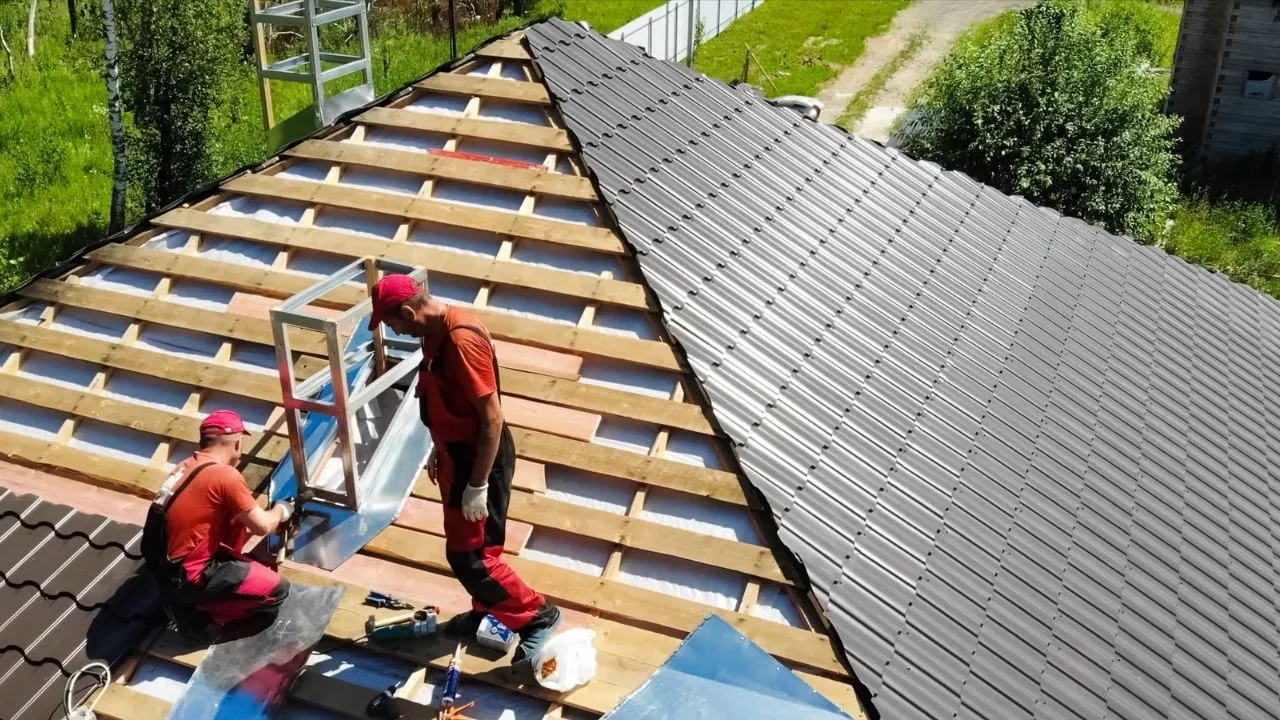Are you looking to start a new Roofing business?
Starting your own roofing company is an exciting opportunity to start from scratch and build something that’s all your own. But it can also be overwhelming, especially if this is the first time you’ve ever started a business. You might not know where to start, what you need to do, or how to get customers.
That’s why we’ve put together this handy guide on how to start a roofing company. We’ll walk you through everything you need to do, from setting up your business to marketing it and getting more customers.
So, if you’re ready to start your own roofing company, continue reading 9 steps to start your roofing business.
Why Start a Roofing Company?
Starting a roofing company can be a great idea. First of all, there will always be a need for roofers since roofs eventually need to be replaced. And since you’ll be starting your own company, you’ll get to choose your hours and work as much or as little as you want.
The global roofing market is expected to be worth $156 billion by 2030. In 2020, it was valued at $102.4 billion. You might also find many opportunities for growth in the roofing industry, as more and more people are looking to replace their roofs with newer and better versions.
In addition, the roofing industry is an excellent opportunity to start your own business. The barriers to entry are relatively low, and there’s plenty of room for growth. So, if you’re looking for a new career or want to start your own business, roofing is a great option.
Learn more: How to market a roofing business?
Can I Start a Roofing Company Without Prior Experience?

You don’t necessarily need experience in roofing to start a roofing company. Of course, it would be helpful if you had some experience in the industry, but it’s not required. But if you have no experience with roofing, you’ll need to hire contractors to carry out the roofing jobs you get.
If you have a bit of experience, you might be able to do some of the work yourself, but you’ll still need to hire roofing contractors for more complex or dangerous jobs.
In any case, it’s essential to do your research and learn as much as you can about roofing before starting your roofing company. There are plenty of resources online and in libraries that can teach you the basics of roofing.
So you want to start a roofing company? Awesome! We will walk you through everything you need to do, from setting up your business to marketing your business and getting more customers.
9 Steps to Start a New Roofing Business

1. Research your target market & competitors
The first step in starting a roofing business is to research your target market and competitors. Who is your ideal customer? What kind of roofs need to be replaced? How much money are they willing to spend on a new roof?
The most common cause for a new business to fail is not doing proper research. If you don’t know who your target market is, you won’t be able to market it effectively.
Once you have researched your customers, you need to research your competitors. What roofing services do they offer? How do they market their business?
You don’t have to reinvent the wheel, as you can learn a lot from your competitors. But you also don’t want to be a copycat, so make sure you offer something unique that sets you apart from the competition.
2. Decide between domestic & commercial roofing
When starting a roofing company, you need to decide whether you will offer services to both domestic (residential) and commercial customers or just one or the other.
Offering services to both domestic and commercial customers can be a great way to grow your business, but it can also be more challenging. You’ll need to have a team of experienced roofers who are comfortable working on both types of roofs.
If you decide to focus on just one type of roofing, you can narrow your target market and tailor your marketing efforts to reach those customers.
You also need to consider what kind of experience you have. Do you have experience working on domestic roofs or just commercial roofs? There are different challenges and benefits to each type of roofing, so you need to decide which type you’re most comfortable with.
3. Decide which roofing services you want to focus on
In addition to deciding whether you want to offer services to domestic or commercial customers, you also need to determine which services you want to focus on.
Do you want to focus on roof replacement or repairing damaged roofs? Do you want to specialise in a specific type of roofing, like shingles or metal roofs?
You don’t have to offer every roofing service, so it’s vital to decide which services you want to focus on. This will help you narrow your target market and tailor your roofing marketing efforts.
4. Write a detailed business plan
After you have researched and decided on your target market, services, and pricing, it’s time to write a detailed business plan.
Your business plan should include your company’s mission statement and your goals and objectives. It should also have a detailed marketing plan to reach your target market.
Your business plan is your roadmap to success, so it’s essential to take the time to write a detailed and comprehensive plan. You also need to work on budgeting and forecasting to have a realistic idea of how much money you will make in the first few years of your business.
If you’re not sure on how you should structure the business plan, you can email us at [email protected], and we’d love to give you a sample business plan that we crafted for one of our clients earlier.
5. Set up your business entity
When starting a roofing company, you need to set up your business entity. This includes registering your company with the government and registering with different taxes you have in your country.
There are different business entities, so you need to decide which one is best for your company. The most common business entities are sole proprietorships, partnerships, LLCs, and corporations.
Each type of business entity has its advantages and disadvantages, so you need to choose the best one for your company. You should also consult with an accountant or lawyer to help you set up your business entity.
You also need to set up a bank account for your business. Make sure you research all of the required paperwork and take the time to do it correctly so you don’t run into any problems down the road.
5. Get proper licenses & insurance
Depending on your location and your services, you may need to get a business licence or permit.
If you’re not sure what licenses and permits you need, you can contact your local Chamber of Commerce or Small Business Administration for obtaining more information. These requirements vary with country or state.
It’s also important to have [liability insurance](https://www.investopedia.com/terms/l/liabilityinsurance.asp) and workers’ compensation insurance._ This will protect you and your business if something goes wrong while someone is working on a roof.
6. Budget to begin with
You’ll need to invest in a few things before you’re fully set up. For example:
- Tools & Equipments
- Workplace
- Legal costs
- Marketing
- Hiring Contractors
- Insurance
- And the list goes on
No matter how well you plan, there will always be some unforeseen expenses that come up when starting a business.
That’s why it’s important to have a cushion in your budget to cover these unexpected costs. You should also have a reserve fund for periods when business is slow or work opportunities are limited.
It’s also important to remember that you won’t be making much money in the first few months or even years of your business.
You need to have enough money saved up to cover your personal and business expenses during this time. Otherwise, you will quickly run into financial trouble and may have to close your business.
You need to carefully think about any business expenses and add them to the Budgeting/Business Plan.
7. Arrange the necessary equipment
One of the first things you need to do is set up a place where you can do the work. This could be in your home or a separate workspace.
You’ll need some basic tools, such as a ladder, screw gun, and drill. You’ll also need a good supply of roofing nails, staples, and tar paper.
If you’re going to be doing the work yourself, you’ll need to invest in good quality tools. You can either buy them new or used, but make sure they’re in good condition.
You should also consider renting or leasing some more expensive equipment, such as a power washer or dumpster. This will help you keep your start-up costs down.
8. Price your services properly
One of the most important things you need to do when starting a roofing company is to set your prices correctly. If you charge too much, you won’t get any customers.
If you charge too little, you’ll lose money on every job. You need to find a happy medium that will allow you to make a profit and still be competitive.
The best way to set your prices is to research the competition and see what they’re charging. You may also want to consider offering different service levels to appeal to a broader range of customers.
9. Work on your sales process & strategy
If you’re starting a new roofing business, no matter how good your services are, you won’t make any money if you can’t sell them. This is why it’s crucial to have a solid sales process and strategy.
A typical sales process starts with generating leads, qualifying them, presenting the proposal, and finally closing the sale.
You need to make sure your process is efficient and effective to maximise your profits. There are a number of different sales strategies you can use, so find one that works best for you and your business.
Learn more about how you can increase your roofing sales.
10. Start marketing your new roofing business
If you can’t reach your target customers and if they don’t know you, then you’re not going to make any money. That’s why Roofer Marketing is so important for your new roofing company.
You need to find a way to reach your target market and let them know about your services. You can use several different marketing channels, such as online advertising, print advertising, or direct mail.
You also need to create good marketing hostage, such as a brochure and a roofing website, so that potential customers can learn more about your company.
When starting a new roofing company, you’ll need to use a cold approach to get your first few customers. That means you will need to go out and find potential customers, rather than waiting for them to come to you.
You can use different methods, such as networking, door knocking, or telemarketing.
Learn more about “Best Roofer Marketing Strategies.”
If you need support in marketing your new Roofing business, we have Roofer’s Digital Breakthrough Program that uses a systematic approach to generate consistent leads for roofing companies, so you never run out of leads.
Do You Feel Ready to Start a Roofing Company?
Starting a roofing company is not an easy task. It takes a lot of hard work and determination to be successful. But if you have the right tools and the right attitude, you can make it happen.
Sign up for a Free 30-minutes strategy session with me today & I’d love to help you plan and make sure you successfully start your new roofing business.



